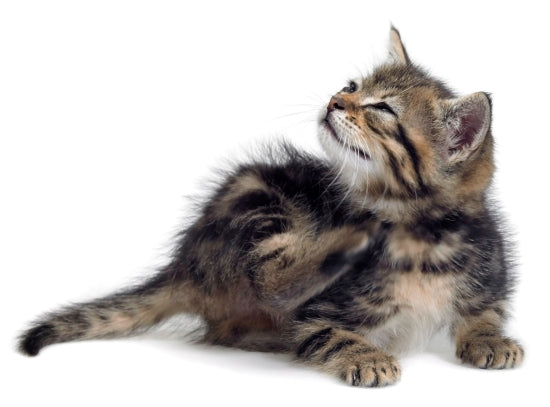
Cats are independent creatures happy to purr in your lap for a while only to jump down to investigate the food bowl or conduct one of many daily grooming sessions. Most cat health issues arise due to conditions the cat encounters outside your home or contagious diseases that can be prevented by vaccination. Cats confined indoors have fewer heath problems but there are some issues that are common to all cats.
Hairballs
Cat hairballs are seldom dangerous but can be messy and annoying. The problem is most often seen in cats with long, thick fur. When grooming, the cat ingests loose hair. Much of the hair may pass through the digestive tracts with no problem. However, the cat's fur can also form into a ball in the animal's stomach. For the feline, this is uncomfortable and he may eat grass in an attempt to force vomiting to relieve the discomfort.
Once the cat regurgitates the hairball, he feels better but his owner may not appreciate cleaning up the mess. Most cats will have a hair ball incident a few times during their life while some pets seem prone to chronic problems with cat hairballs.
Laxatone comes in several flavors for picky cats. This gel acts as a lubricant to keep the cat hairs from sticking together when they are ingested. This decreases the vomiting by helping the hair pass through the digestive system naturally. Petromalt is a similar hairball remedy that makes the hair easier to digest.
Frequent brushing will remove much of the loose fur on your cat before his grooming and licking causes him to swallow it. A habit of daily brushing of your long haired cat combined with a hairball remedy can greatly reduce the frequency of vomiting caused by cat hairballs.
De-Worming and Parasite Control
Untreated hookworms, roundworms, whipworms and tapeworm in cats can seriously harm the health of your pet. Cats may develop chronic diarrhea, anemia and weight loss and young kittens may die from the dehydration and blood loss resulting from parasites.
It is not only possible to treat worms and parasites - the treatment is simple and cost effective for pet owners. Cat worm medicine should be given to your cat on a regular basis. You may think the cat in your home is not exposed to worms but you would be wrong. Almost all pets have worms at some time. The problem of worms in cats is especially important in newborn kitten care. Kittens may be born with worms in their little system and worming small kittens is standard health care for cats.
Worm medications such as Drontal or pyrantel pamoate may be in tablet or liquid form and are given by mouth. This may sound easier than it is as cats are notorious for their resistance to taking a pill and will even ignore food when they know it contains medication. The quickest way to ensure your feline actually swallow his worm medicine is to administer a liquid with a small syringe that releases the medicine in the back of the cat's mouth. Swallowing is then his only alternative.
Cat Dental Health
The idea of cat teeth cleaning or feline gingivitis is a relatively new addition in the field of health care for cats. During health exams, the cat's teeth received only a cursory inspection in the past. Now we know that dental health in cats is as complex and problematic as the health of teeth and gums in humans.
Cats eat and salivate and both of those can lead to tooth and gum problems. Plague builds up and forms tarter on the feline teeth when joined with minerals in the cat's saliva. Cat teeth can decay and gums may become inflamed and infected.
Feline gingivitis is common and uncomfortable. If your cat has bad breath or is drooling, this may be an indication of infection causing pain in his mouth. Bacteria growing as infection in the animal's can move through the blood stream and attack organs such as the liver, kidneys and the heart.
Evaluating the dental health of your cat will require the expertise of your veterinarian. It may take help to open your cat's mouth wide enough to clearly see the back teeth where dental problems will be most visible.
Dental examinations are also useful in routine health exams. Gums that are constantly inflamed may be a problem of feline gingivitis or a symptom of a serious problem in the immune system. Drooling may indicate pain from an infected tooth but may also be a symptom of a growth in the mouth or throat.
By following basic guidelines for feline health care you can provide your cat with an active, comfortable and happy life as a valuable member of your family. Treat common cat health problems quickly as they occur to avoid secondary infections and life threatening emergencies.

Leave a comment
This site is protected by hCaptcha and the hCaptcha Privacy Policy and Terms of Service apply.